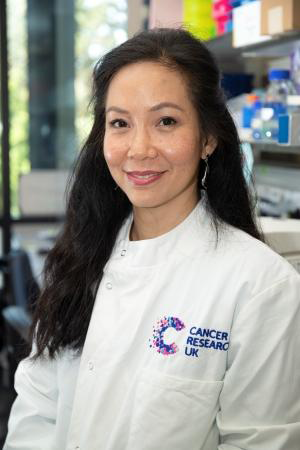Submitted by Irena Rao on Thu, 16/06/2022 - 12:01
Professor Serena Nik-Zainal is one of the Cambridge scientists who will receive around £4m as part of Cancer Grand Challenges, a major initiative co-founded by Cancer Research UK and the National Cancer Institute in the US, which aims to encourage the world’s leading cancer researchers to take on some of the toughest challenges in cancer research.
Professor Serena Nik-Zainal, of the University of Cambridge Early Cancer Institute and Department of Medical Genetics, is Co-investigator in the eDyNAmiC (extrachromosomal DNA in Cancer) team, which will investigate new ways to combat treatment resistant cancers.
Led by Professor Paul Mischel at Stanford University, the eDyNAmiC team hopes to tackle tumour evolution, which is driven by circular pieces of tumour DNA which exist outside the tumour and pose a major problem by enabling tumours to resist treatment.
Research is now revealing that a major driver of tumour evolution is extrachromosomal DNA (ecDNA). These small circular DNA particles enable cells to rapidly change their genomes and so evade the immune system.
EcDNA doesn’t follow the rules of normal chromosomes, providing tumours a way to evolve and change their genomes to evade treatment.
Although first observed in cancer in 1965, researchers are only beginning to understand the extent to which it is prevalent in around a third of cancers and how it helps tumours to become more resistant, aggressive and affect patient survival.
The goal of eDyNAmiC is to understand how extrachromosomal DNA is created, to find vulnerabilities and then to develop new ways to target these in some of the hardest cancers to treat, including glioblastoma, lung and oesophageal cancer.
Serena said: "My team and I are so excited to be part of this collaboration studying this phenomenon of extra pieces of DNA called ecDNA. This challenge caught my eye because it is an observable genomic abnormality, it is not uncommon and it may hold the answers to how to prevent disease progression in some of our most lethal cancers.
"What a privilege it is to be entrusted to explore how ecDNAs cause cancer and drive them to be aggressive. We hope that what we learn will bring real benefits to cancer patients in due course."
Read more about the Extrachromosomal DNA Grand Challenge
Cambridge researchers tackle cancer roadblocks
The other 'Grand Challenge' which involves Cambridge researchers is CANCAN2 (CANcer Cachexia Action Network), which will explore the underpinning mechanisms behind cancer cachexia - a debilitating wasting condition many people experience in the later stages of the disease.
The CANCAN2 team is led by US researchers who will work with co-investigators Professor Sir Stephen O’Rahilly and Dr Tony Coll, of the Wellcome-MRC Institute of Metabolic Science, and Dr Giulia Biffi, of the CRUK Cambridge Institute. It is hoped further research can help develop new treatments to improve quality of life for cancer patients and set the standard for cachexia management around the world.
The eDyNAmiC and CANCAN teams are among four winning teams announced in the latest round of Cancer Grand challenges – a ground-breaking £425m cancer research initiative co-founded in 2020 by Cancer Research UK and the National Cancer Institute in the US.
Find out more at cancergrandchallenges.org

